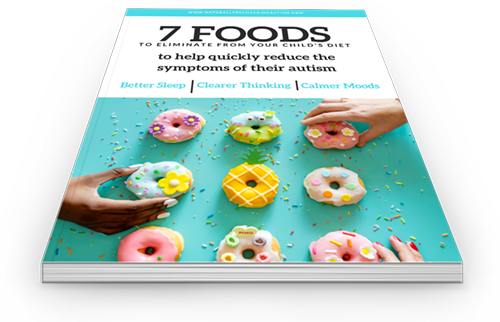Inflammation is a crucial process for our health, but when it becomes chronic, it can lead to a host of health problems.
Recent studies have suggested that inflammation may play a role in the development of autism. A study published in the Journal of Neuroinflammation found that children with autism had higher levels of inflammatory markers in their blood than typically developing children.
Another study published in the Journal of Autism and Developmental Disorders found that children with autism had higher levels of inflammatory cytokines in their brains than typically developing children.
Some Causes of Inflammation
Environmental toxins including heavy metals, coinfections, pathogens (viruses, fungi, candida, parasites, Lyme, Mold, etc), Poor diet, Electromagnetic Field Radiation, plus maternal stress increases inflammation in the fetus.
What is inflammation and how is it related to autism?
Inflammation is a natural response by the immune system to protect the body from harmful stimuli such as pathogens or toxins. However, when inflammation becomes chronic, it can lead to tissue damage and a variety of health problems, including autoimmune disorders, heart disease, and even neurological disorders like autism.
Recent research has suggested that inflammation may contribute to the development of autism by disrupting brain development in utero or early childhood. Inflammation can also exacerbate symptoms associated with autism, such as irritability and social withdrawal.

When the immune system is overactive, it can lead to chronic inflammation, but we must modulate the immune system to regulate it. Never boost the immune system in a child with autism.
Other studies have shown that children with autism have higher levels of antibodies against their own brain tissue, suggesting that the immune system may be attacking healthy brain cells. This is common with PANS.
PANS is an acronym for Pediatric Autoimmune Neuropsychiatric Syndrome. Parents may notice a sudden onset of symptoms such as obsessive compulsive disorder (OCD), or tiks. Tiks can be motor tiks where their body jerks rapidly, (not wiggling), or vocal tiks. Additional symptoms include separation anxiety, a decline in school such as in their reading and math abilities, simplified language, baby talk, bed wetting, and increased urination, aggression, and anxiety with stress.
PANS predisposes one to the symptoms of autism. Autism being a co diagnosis. Instead of a fever their brain will be affected, and thus, their psychology. PANS affects the immune system which is commonly weak in those with autism, so they are a higher percentage.
This needs to be regulated right away so we can stop the attack on the brain.
An additional immune response that causes further issues is Mast Cell Activation Syndrome (see detoxification page). Close to 100% of children with autism have histamine intolerance and mast cell activation. Histamines are released by the digestive tract and the brain in defense as an allergic reaction.
The DAO enzyme helps the body break down excess histamines, but commonly, this enzyme is defective in children with autism. In histamine intolerance the body is over producing histamines and there are too many for the body to break down. This stress type response is a trigger for mast cell activation which creates a strong inflammatory response in the body.
These findings suggest that abnormalities in the immune system may contribute to inflammation and other symptoms seen in individuals with autism.
Researchers look at ways of doing this with drugs. We don’t need harmful drugs with negative side effects. We have natural solutions.
Researchers at the UC Davis MIND Institute have found that children with autism spectrum disorder (ASD) have reduced immune system regulation, as well as shifts in their gut microbiota.
“Some children with ASD have this decrease in regulatory cytokines, the proteins that regulate inflammation, which leaves them more prone to inflammation. “This increased inflammation may manifest as GI symptoms, allergies, asthma or some other form.”
-The ASD/GI children also had lower levels of the protein TGFβ1, which is responsible for regulating the immune response. In addition, the group had higher levels of the protein zonulin, which regulates cell junctions in the GI tract, influencing gut permeability.-
We never boost the immune system in a person with autism. We must regulate or modulate the immune system or they can easily go into a hyper-immune response which is an autoimmune reaction. This is what I was referring to before with what can become PANS.
One researcher noted, “Children with ASD with increased inflammation are often those who exhibit the most severe behaviors. This immune activation is not helping these children. It might not be causing autism – we don’t know that yet – but it’s certainly making things worse.”
The ASD/GI children also had lower levels of the protein TGFβ1, which is responsible for regulating the immune response.
The findings on TGFβ1 may be the most intriguing. The protein was deregulated in both ASD groups, suggesting that the children who don’t experience GI symptoms may be suffering from other inflammatory conditions.
Source: https://www.ucdavis.edu/
I’d like to make a side note here that TGFβ1 is dysregulated with the mold biotoxin illness which is extremely common in children with autism.
–
Inflammation may be main driver of autism find scientists who studied the brains of eight children on the spectrum who had died [https://www.dailymail.co.uk/health/article-7547355/Inflammation-main-driver-autism-say-scientists-studied-brains-8-kids-spectrum.html]
Researchers compared the brains of eight children with the developmental disorder and eight children without it.
They found the parts of the autistic children’s brains that are crucial to working memory and attention – areas that are impaired in people who have autism – had unusually high levels of a molecule known to trigger inflammation.
Results showed that the brains of the children with ASD had increased numbers of a protein called Interleukin-18 (IL-18).
A new study led by Tufts University School of Medicine in Boston, Massachusetts, has found that high numbers of this inflammatory protein are found in the brains of children with autism spectrum disorders.
This particularly occurred in the amygdala, the part of the brain that is responsible for detecting fear, and the dorsolateral prefrontal cortex, which is involved in cognitive skills that include working memory, attention and evaluating rewards.
IL-18 is known to bring about serious inflammatory responses, which suggests it may play a role in some inflammatory diseases, particularly of the skin such as psoriasis.
–
The study goes on to say how they feel anti-inflammatory drugs that target inflammation may be helpful, but I wonder why they would think only targeting the inflammation but not the causes of it would take care of the actual problems? It would not. It would only be a temporary fix masking the actual problem.
Long-term results come from fighting the inflammation with natural resources while detoxifying the toxins, and alleviating the pathogens and coinfections that are causing it. We must work with the underlying root causes of the inflammation, and it can be done naturally and safely without drugs that often have negative side effects.
Studies have shown that children with autism often have higher levels of inflammation than typically developing children.
Studies increasingly indicate a strong inflammatory state associated with ASD [11]. This inflammatory condition is often linked to immune system dysfunction [12]. Enhanced inflammatory activity in ASD children has been demonstrated through pro-inflammatory biomarkers analysis.
Children with autism often have chronic inflammation. This is not only a problem in the digestive system but also in the brain. Inflammation impairs brain cells and it can also kill them.
If the brain cells are weakened, they are even less capable of fending off toxins or excreting them once they have entered the cell.
Inflammation also damages the blood-brain barrier. This is the brain’s protective shield against toxins. Without it, the brain is vulnerable to much damage, whether it is from undigested food particles in the bloodstream, or environmental toxins such as heavy metals, pesticides, household chemicals, and more.
The most common disorders caused by inflammation are anxiety and obsessive- compulsive disorder, but many more can exist. One more critical factor is inflammation’s ability to alter neurotransmitters.
Neurotransmitters are the brain’s messengers. They affect things like mood, sleep, and appetite. Particularly vulnerable to inflammation is the neurotransmitter dopamine. When there is a deficiency in dopamine, it causes fatigue, lack of focus, moodiness, and problems with fine motor coordination.
The most common places to look for inflammation are in the gut and the mouth. Problems with teeth are a common indicator that the immune system is fighting on an ongoing basis which can also lead to autoimmune disorders. The inflammation in the gut leads directly via the blood to inflammation and chronic disorders of inflammation in the brain.
Testing For Gut Inflammation
The laboratory, Diagnos-Techs, offers a panel used with your child’s stool that can give their inflammation markers along with a lot of other valuable information. The test can also check for IgA antibodies (gluten allergens), parasites, fungus, and more. Most alternative practitioners use this laboratory and have these tests on hand, or they can order them at diagnostechs.com.
However, many practitioners don’t know about all of the underlying issues with autism or how to work with them naturally and effectively. Testing is an expense that can be avoided because we already know children with autism have gut and pathogen issues, therefore they have inflammation. Spending your funds on the resources that can help your child get better are a far greater way to go for getting results.
What to Do
When researching online we see captions that say all you need to do to reduce inflammation is have your child eat more fruit, sleep better (which they likely aren’t doing despite your good efforts), but there is SO MUCH MORE that is necessary to do to reduce inflammation.
There are supplements that help with inflammation, and they are important, but equally important are the supplements and correct diet to support strengthening the detoxification pathways and strengthening the overall foundation. It’s never just one thing. Each health issue regarding the underlying causes must be worked with thoroughly and properly, or you will fall short of results, regardless of your efforts.
It is imperative to work with these causes, not just symptoms. Causes such as toxins including glyphosate and heavy metals, from pathogens such as candida and parasites, and coinfections such as mold biotoxins, Lyme disease, and autoimmune issues such as PANS.
These continually affect the gut and keep it from getting healthy. This means the brain too since the gut directly affects the brain. You may be doing a lot of great work for your child with diet which is very important and stage 1, but these underlying root causes must all be worked with.
I also commonly find that parents do not realize the negative impact of many of the foods their child is still eating. Be sure your child’s diet is free of inflammatory foods which I have laid out for you in my free food guide.
Please get the guide now to begin eliminating the top most inflammatory foods from your child’s diet.
This is the first step to begin stabilization and support the foundation of health, and immunity, then we move onto the other 3 stages. An A-Z protocol for autism recovery is essential for the best results. I can lead you through this process and support you on this journey. See more on this below.
Get Your Free Food Guide!
Quickly Reduce Your Child’s Symptoms of Autism by Eliminating 7 Foods Most People Consume Daily!
The first crucial step of autism recovery is to begin restoring health to the gut and the immune system.
The health of the gut is directly linked to the health of the brain and therefore to the symptoms of autism. In fact, 80% of the immune system comes from the gut so if the gut is not healthy, then the brain can’t thrive, and the immune system is compromised. It’s a vicious cycle, but thankfully, it’s one that we can put an end to by first eliminating harmful foods.
- Harmful Foods: Identify the foods that worsen autism symptoms and understand the science behind their impact.
- Smart Food Choices: Learn about easy dietary swaps that can significantly enhance sleep, clarity of thought, and emotional well-being.
- Practical Implementation: Get valuable tips on how to implement these dietary changes easily and effectively.
This is for informational purposes only and is not meant to diagnose or treat. Every child’s level of recovery is different. No two people are the same. It is never implied that all children will have the same outcome. Results are all based on individual biology and the work that is done. This process takes time and various steps, effort and resources need to be weighed. Our programs are intended to help you become more knowledgeable and guide you to help bring your child a better quality of life, whatever that may be. We want to help by giving great content, direction and strategies that move you forward. Nothing on this page or any of our websites is a promise or guarantee of results or future outcomes. The results on this page and any of our websites are not typical or promised. In fact, there will be people who purchase this and other programs and never put the work into implementing the strategies taught and therefore will achieve little to no results. Our more detailed earnings disclaimer, privacy policy, and terms and conditions for this program and website can be accessed via the links below. We hold ourselves (and you) to a high standard of integrity. We are cheering you on every step of the way.












